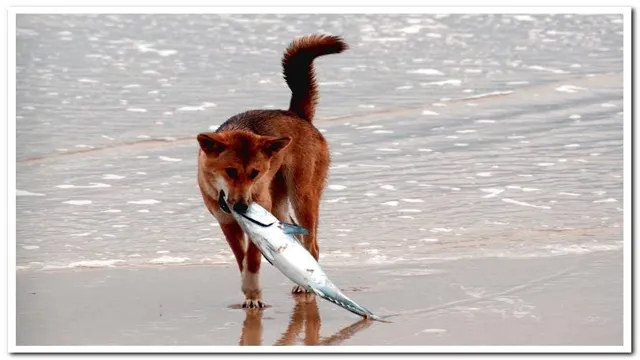Which Fish Can Dogs Safely Eat? A Guide to Feeding Your Furry Friend

Do you have a furry friend at home who loves to beg for food? Are you wondering if it’s safe to give them a fishy treat? Well, you’ve come to the right place! In this blog, we’ll dive into the question of whether dogs can eat fish. We’ll discuss the safety and nutritional benefits of fish for dogs, as well as the potential risks associated with feeding it to your pup. So, grab a fish fillet and read on to find out the answer to the question: can dogs eat fish?
What Types of Fish Can Dogs Eat?
When it comes to the diet of our beloved four-legged friends, knowing what can and can’t be eaten is essential. Many pet owners are curious to know, “Which fish can dogs eat?” The short answer is that dogs can eat a variety of fish, including salmon, tuna, mackerel and whitefish. However, there are certain types of fish that should be avoided due to their high levels of mercury, such as swordfish and shark. Additionally, canned fish should be avoided as it often contains added salt. Fish is a great source of protein and omega-3 fatty acids, which are important for a dog’s health.
Protein helps maintain a healthy weight, and omega-3 fatty acids help with joint health, skin and coat health, and the immune system. When it comes to feeding your pup fish, it’s important to make sure it’s cooked thoroughly. Raw fish can contain parasites and bacteria which can be harmful to your dog’s health. Additionally, any bones should be removed as they can cause choking or digestive irritation. It’s also important to make sure that you’re not overfeeding your pup.
Too much fish can lead to an imbalance in the omega-3 to omega-6 fatty acid ratio, which can cause inflammation. Too much protein can also be harmful, leading to an increase in the risk of certain diseases. In general, it’s a good idea to consult with your veterinarian before adding any type of fish to your pup’s diet. Your vet can help you determine the right amount and type of fish that’s best for your dog. So while there are a variety of fish that dogs can eat, it’s important to do your research and make sure you’re feeding your pup the right type and amount.
Cooked Fish
Are you wondering which fish your four-legged friend can enjoy? It can be tricky to decipher which types of fish are safe for your canine companion. Cooked fish that is low in mercury and salt can be a great addition to your pup’s diet. Fish such as salmon, cod, and trout are all considered safe for dogs to eat. While they are healthy and packed with protein, be sure to limit the amount served to your pup and make sure to remove all bones before serving as they can be a choking hazard.

Canned Fish
When it comes to canned fish, many pet owners are wondering which fish can their four-legged friends safely eat. Though there are a variety of options to choose from, the most common types of canned fish that are safe for dogs are tuna, salmon, and sardines. Not only are these fish rich sources of Omega-3 fatty acids, which can help with your pet’s cardiovascular health, but they are also low in mercury and can provide an excellent source of protein. As always, it’s important to ensure that the canned fish you feed your pup is free from any additives or other preservatives, as they could be harmful to your pet.
Salmon
Salmon is one of the most popular fish to eat, but can dogs eat salmon? The answer is yes! Salmon is an excellent source of protein, omega-3 fatty acids, and other essential nutrients that are beneficial for both humans and dogs alike. The only caveat is that dogs should only eat cooked salmon, not raw. Raw salmon can contain parasites that can make your furry friend sick, so it’s important to make sure that your pup’s salmon is cooked thoroughly before feeding it to them. With that said, salmon is a great way to add variety to your pup’s diet and can provide them with a nutritious meal that they’ll love!
Tuna
Tuna is a great fish for dogs to enjoy as part of their diet. Not only is it a tasty meal for your pup, but it also has a variety of health benefits. Tuna is a good source of lean protein, which helps support muscle growth and development. It’s also packed with omega-3 fatty acids, which are essential for healthy skin and fur. Plus, it’s low in mercury, so it’s safe for dogs to eat.
So, if you’re looking for a delicious and nutritious meal for your pup, tuna may be the perfect choice!
What Types of Fish Should Dogs Avoid?
When it comes to feeding our furry friends, most pet owners want to make sure that our dogs are getting the healthiest diet possible. While it is important for dogs to get a balanced diet of proteins and carbohydrates, there is one food group that can pose a serious risk to our pets: fish. Many types of fish contain high levels of mercury, and eating too much can cause mercury poisoning in dogs. To ensure your pup’s safety, it is important to know which fish can and cannot be safely fed to your dog.
First and foremost, any fish that has not been cooked or prepared correctly can be harmful to your dog.Raw fish is particularly dangerous, as it can contain parasites that can cause digestive issues or other illnesses. In addition, any fish that contains high levels of mercury should be avoided. This includes large predatory fish such as swordfish, tuna, and shark. These types of fish feed off of smaller fish, which accumulate higher levels of mercury in their bodies. While these large predatory fish should be avoided, there are a few varieties of fish that are safe for your pup.
Smaller, non-predatory species such as tilapia, cod, haddock, and salmon are all excellent sources of protein for your dog. Additionally, fish such as sardines and mackerel are rich in Omega-3 fatty acids, which can help to promote healthy skin and coat. It is important to remember, however, that fish should only make up a small portion of your dog’s diet. Too much fish can lead to an unbalanced diet, as well as unwanted weight gain. Additionally, it is important to note that some dogs may have allergies to certain types of fish, so it is best to consult with your veterinarian before introducing any new foods into your pup’s diet.
Overall, knowing which fish can and cannot be safely fed to your dog is an important part of providing them with a healthy diet. While there

Raw Fish
Can dogs eat raw fish? While there are many types of fish that are safe for dogs to eat, some of the most popular include salmon, trout, and tuna. These fish are high in protein, omega-3 fatty acids, and other essential vitamins and minerals. However, there are some risks associated with feeding your pup raw fish. It is important to be aware of the potential risks and take steps to ensure that your pup is getting the healthiest fish possible. For example, you should always make sure the fish is fresh and free of parasites, as these can be dangerous for your pup.
It’s also important to avoid giving your pup fish with bones, as these can cause choking or intestinal blockage. When it comes to raw fish, it is best to consult your vet for the safest option for your pup.
Fish with Bones
Are you looking for a delicious treat to feed your pup? If so, you may be wondering which fish can dogs eat. The answer is not as straightforward as you might think. While some fish contain bones that can be dangerous for dogs to consume, there are many species that are safe. Fish such as salmon, sardines, and whitefish are all good options for dogs, as they are high in protein and omega-3 fatty acids and contain no bones. However, when feeding your pup fish, it is important to ensure that it is cooked thoroughly as raw fish can contain parasites that can be harmful.
So, if you’re looking for a tasty and nutritious treat for your pup, look no further than fish with bones!
Fish with High Mercury Content
Caring for your canine companion also means being mindful of their dietary needs. While dogs can eat a wide variety of foods, some fish should be avoided due to their high mercury content. Fish such as swordfish, shark, king mackerel, and tilefish all have high levels of mercury that can be dangerous to your pup’s health. Fortunately, there are plenty of delicious and nutritious fish that are safe for your pup to enjoy, such as salmon, trout, sardines, and tilapia. So, when you’re looking for a tasty meal for your pup, opt for fish that are low in mercury and high in flavor.
Conclusion
It’s a ruff situation, but the answer is none- dogs should not eat fish!”
FAQs
Which fish can dogs eat?
Dogs can eat cooked, boneless, and unseasoned fish, such as salmon, trout, and whitefish.
Are all fish safe for dogs to eat?
Not all fish are safe for dogs to eat. Fish with high levels of mercury or other contaminants may be unsafe for dogs to consume.
Is it safe for dogs to eat raw fish?
It is not recommended for dogs to eat raw fish, as it can contain parasites and bacteria that can make them ill.
Can dogs eat canned fish?
Canned fish, such as tuna and sardines, can be fed to dogs in moderation. Be sure to check the label for added ingredients that may be harmful to your dog.
Can dogs eat cooked fish bones?
Cooked fish bones can be dangerous for dogs to consume. They can easily splinter, which can lead to choking or internal damage.
Is it safe for dogs to eat smoked fish?
Smoked fish can be safe for dogs to consume in moderation. However, smoked fish can contain high levels of salt and fat, so it should be given in small amounts.




